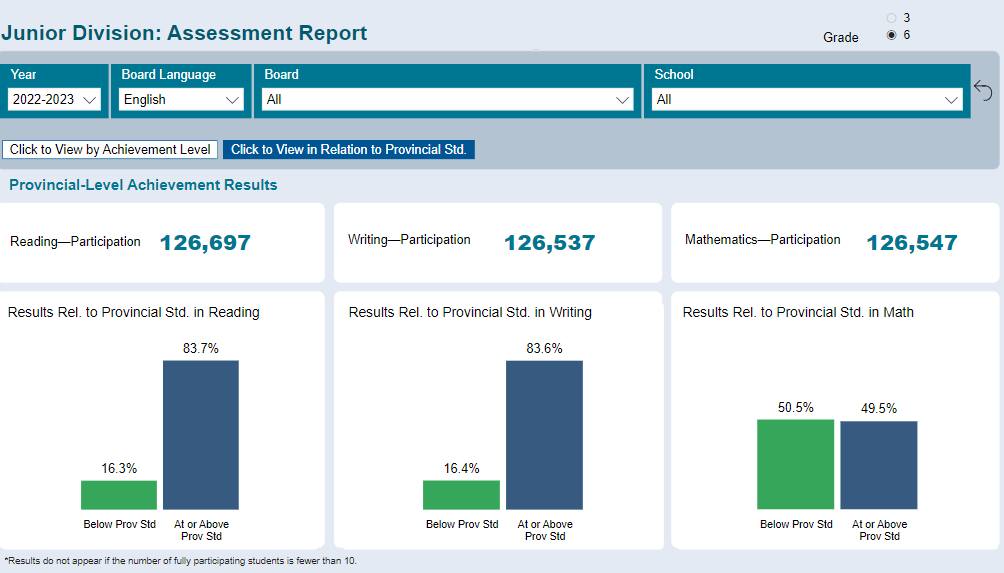Ontario reading, writing and math scores see little improvement in 2023
Ontario students’ math and literacy scores have not seen a big improvement over the last year, according to new data released by the Education Quality and Accountability Office (EQAO).
The data for 2022-2023 includes the scores of 580,000 Grade 3, Grade 6 and Grade 9 students across the province, in both English and French language schools.
Ontario Education Minister Stephen Lecce says the data speaks “to a broader phenomenon of stabilization in our core fundamental areas of reading, writing and math.”
He noted the scores were “a good sign” and “an incremental move towards the right direction.”
“There's a lot of work to do.”
- Download our app to get local alerts on your device
- Get the latest local updates right to your inbox
The Progressive Conservative government has made a big push to overhaul math and language curriculums over the last few years. In 2020, the province revealed a new math curriculum that focused on financial literacy, coding and “back to basics” fundamentals.
About 59.7 per cent of Grade 3 students and 49.5 per cent of Grade 6 students met or exceeded provincial standards when it came to mathematics, the EQAO reported. This represents a less than one percentage point improvement for the younger students and just over a two percentage point increase for those in Grade 6.
Grade 3 reading and writing scores were similar. About 72.6 per cent of students were at or above provincial standards for reading, a slight dip from the 73.2 per cent last year.
Meanwhile, writing scores improved by about 0.6 percentage points.
For Grade 6 students, scores for writing dropped slightly from 84.1 per cent to 83.6 per cent. A similar dip was recorded in reading.
 This chart shows Grade 6 EQAO scores, released on Oct. 12, 2023.
This chart shows Grade 6 EQAO scores, released on Oct. 12, 2023.
Grade 9 test scores saw a minor improvement overall, with about 53.7 per cent of students at or above provincial standards, up from 52.3 per cent.
This September, students between Grades 1 and 9 began a new language curriculum that focuses on “time-tested practices” such as phonics, cursive writing, digital literacy, word processing and critical thinking skills.
The government has also revamped school board management and has identified three provincial education priorities: achievement of learning outcomes in core academic skills, preparation of students for future success, and student engagement and well-being.
Boards are now required to adopt these priorities in their multi-year plans and report on their success. A new regulation posted earlier this month would also create a process in which the director of education can be evaluated based on these priorities.
CTVNews.ca Top Stories

Trudeau calls violence in Montreal 'appalling' as NATO protest continues
Anti-NATO protesters gathered again in Montreal on Saturday to demand Canada withdraw from the alliance, a day after a demonstration organized by different groups resulted in arrests, burned cars and shattered windows.
7 suspects, including 13-year-old, charged following 'violent' home invasion north of Toronto
Seven teenage suspects, including a 13-year-old, have been arrested following a targeted and “violent” home invasion in Vaughan on Friday, police say.
These vascular risks are strongly associated with severe stroke, researchers say
Many risk factors can lead to a stroke, but the magnitude of risk from some of these conditions or behaviours may have a stronger association with severe stroke compared with mild stroke, according to a new study.
Widow of Chinese businessman who was executed for murder can sell her Vancouver house, court rules
A murder in China and a civil lawsuit in B.C. have been preventing the sale of multiple Vancouver homes, but one of them could soon hit the market after a court ruling.
Cher 'shocked' to discover her legal name when she applied to change it
Cher recalls a curious interlude from her rich and many-chaptered history in her new book 'Cher: The Memoir, Part One.'
Black bear killed in self-defence after attack on dog-walker in Maple Ridge, B.C.
A black bear has died following a brawl with a man on a trail in Maple Ridge, B.C.
Retiring? Here's how to switch from saving for your golden years to spending
The last paycheque from a decades-long career arrives next Friday and the nest egg you built during those working years will now turn into a main source of income. It can be a jarring switch from saving for retirement to spending in retirement.
Canadian neurosurgeons seek six patients for Musk's Neuralink brain study
Canadian neurosurgeons in partnership with Elon Musk's Neuralink have regulatory approval to recruit six patients with paralysis willing to have a thousand electrode contacts in their brains.
Police thought this gnome looked out of place. Then they tested it for drugs
During a recent narcotics investigation, Dutch police said they found a garden gnome made of approximately two kilograms of MDMA.

































